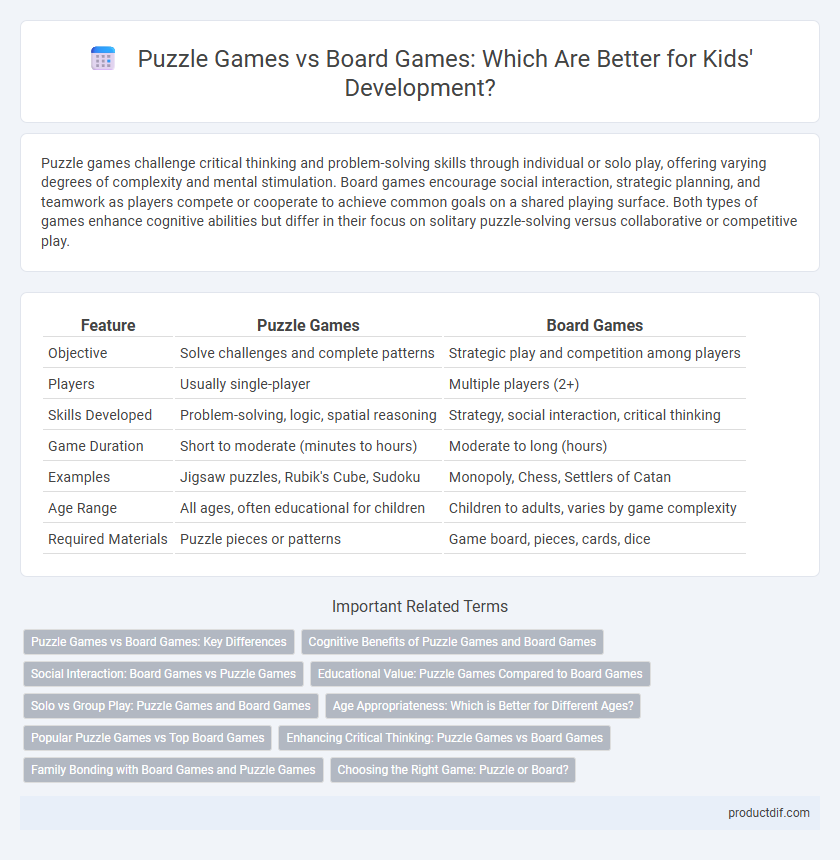Puzzle games challenge critical thinking and problem-solving skills through individual or solo play, offering varying degrees of complexity and mental stimulation. Board games encourage social interaction, strategic planning, and teamwork as players compete or cooperate to achieve common goals on a shared playing surface. Both types of games enhance cognitive abilities but differ in their focus on solitary puzzle-solving versus collaborative or competitive play.
Table of Comparison
| Feature | Puzzle Games | Board Games |
|---|---|---|
| Objective | Solve challenges and complete patterns | Strategic play and competition among players |
| Players | Usually single-player | Multiple players (2+) |
| Skills Developed | Problem-solving, logic, spatial reasoning | Strategy, social interaction, critical thinking |
| Game Duration | Short to moderate (minutes to hours) | Moderate to long (hours) |
| Examples | Jigsaw puzzles, Rubik's Cube, Sudoku | Monopoly, Chess, Settlers of Catan |
| Age Range | All ages, often educational for children | Children to adults, varies by game complexity |
| Required Materials | Puzzle pieces or patterns | Game board, pieces, cards, dice |
Puzzle Games vs Board Games: Key Differences
Puzzle games emphasize individual problem-solving skills, requiring players to complete tasks like matching pieces or solving riddles. Board games often involve multiple players, combining strategy, chance, and social interaction on a game board. Puzzle games typically focus on cognitive challenges, while board games balance strategy with player competition and cooperation.
Cognitive Benefits of Puzzle Games and Board Games
Puzzle games enhance problem-solving skills and improve spatial reasoning through pattern recognition and critical thinking challenges. Board games promote social interaction, strategic planning, and memory retention by engaging players in competitive and cooperative scenarios. Both types of games contribute to cognitive development, with puzzle games emphasizing analytical skills and board games fostering communication and decision-making abilities.
Social Interaction: Board Games vs Puzzle Games
Board games foster dynamic social interaction by encouraging players to communicate, strategize, and collaborate face-to-face, enhancing social skills and bonding. Puzzle games often promote solitary engagement, focusing on individual problem-solving and cognitive development with limited direct social interaction. Choosing between the two depends on prioritizing either communal experience or personal challenge in playtime activities.
Educational Value: Puzzle Games Compared to Board Games
Puzzle games enhance critical thinking and spatial awareness by challenging players to solve complex problems independently, promoting cognitive development. Board games foster social skills and strategic planning through interactive gameplay that requires communication and collaboration. While both support educational growth, puzzle games emphasize individual problem-solving abilities, whereas board games encourage teamwork and decision-making in group settings.
Solo vs Group Play: Puzzle Games and Board Games
Puzzle games excel in solo play by challenging individual problem-solving and critical thinking skills, offering a personalized and immersive experience. Board games foster social interaction and teamwork, making them ideal for group play that enhances communication and strategic collaboration. Both game types support cognitive development, but their distinct play settings cater to different social dynamics and player preferences.
Age Appropriateness: Which is Better for Different Ages?
Puzzle games often target specific cognitive skills and are ideal for younger children aged 3 to 7, helping develop problem-solving and fine motor abilities. Board games typically cater to a broader age range, from preschoolers to adults, promoting social interaction and strategic thinking. Choosing between puzzle games and board games depends on the child's developmental stage and the desired learning outcomes.
Popular Puzzle Games vs Top Board Games
Popular puzzle games such as Rubik's Cube, Sudoku, and jigsaw puzzles engage critical thinking and spatial reasoning, attracting players who enjoy individual challenges and cognitive skill development. Top board games, including Settlers of Catan, Monopoly, and Risk, emphasize social interaction, strategy, and competition, appealing to groups and family settings. Both genres contribute significantly to the toy industry by enhancing mental agility and entertainment through distinct gameplay experiences.
Enhancing Critical Thinking: Puzzle Games vs Board Games
Puzzle games enhance critical thinking by requiring players to solve complex problems, recognize patterns, and develop strategic approaches individually, fostering analytical skills and mental agility. Board games promote critical thinking through social interaction and strategic decision-making, encouraging players to anticipate opponents' moves and adapt tactics in a dynamic environment. Both puzzle and board games cultivate problem-solving abilities, but puzzle games emphasize individual cognitive challenges, while board games focus on collaborative and competitive strategy development.
Family Bonding with Board Games and Puzzle Games
Board games enhance family bonding by encouraging direct interaction, teamwork, and strategic thinking, creating shared experiences that strengthen relationships. Puzzle games also foster family connection through collaborative problem-solving and critical thinking, promoting patience and communication among members. Both game types provide valuable opportunities for family members to engage meaningfully, improving cooperation and emotional ties.
Choosing the Right Game: Puzzle or Board?
Choosing the right game depends on the preferences and developmental benefits sought; puzzle games enhance problem-solving skills and cognitive flexibility, while board games foster social interaction and strategic thinking. Puzzle games, such as jigsaw or logic puzzles, require individual focus and improve spatial reasoning, whereas board games like chess or Monopoly encourage teamwork and competitive strategies. Considering factors like age group, desired learning outcomes, and play environment helps determine whether a puzzle or board game offers the best entertainment and educational value.
Puzzle Games vs Board Games Infographic

 productdif.com
productdif.com